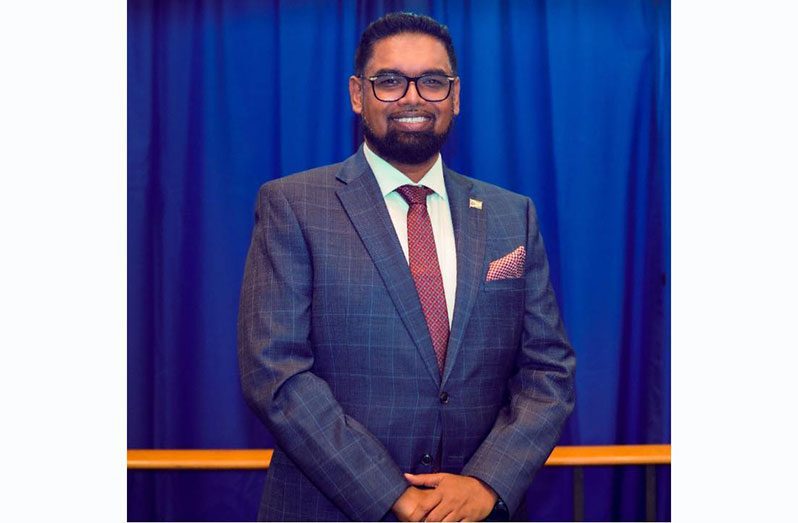–says President Ali at launch of ‘Living Soils Initiative in Africa’
IN his address at the launch, via Zoom, of the Inter-American Institute for Cooperation on Agriculture’s (IICA’s) ‘Living Soils Initiative in Africa’, President Dr. Irfaan Ali underscored Africa’s immense potential to emerge as a significant player in the global food supply chain.
Citing the continent’s abundant natural resources and untapped agricultural opportunities, the Guyanese leader expressed confidence in Africa’s ability to contribute substantially to addressing global food security challenges and mitigating climate change.
He emphasised that the “hour has arrived” for Africa, and expressed his earnest belief that the coming decades “will belong to Africa”. President Ali said that after centuries of colonisation and resource exploitation, the continent still has an abundance of natural resources.
“According to the United Nations (UN) Environment Programme,” he said, “Africa possess 30 per cent of the world’s mineral reserves, eight per cent of the world’s natural gas, 40 per cent of the world’s gold, 90 per cent of the world’s chromium and platinum, [and] the largest reserves of cobalt, diamonds, platinum and uranium.”
But he said that when he talks about Africa going through a revolutionary period, he is not just talking about its mineral potential but also its agricultural and environmental potential.
The Head of State said: “As is known, Africa is also home to 65 per cent of the world’s uncultivated arable land, and 10 per cent of the planet’s internal renewable freshwater resources. With its expansive arable lands and abundant freshwater resources, Africa has the unquestionable potential to emerge as a significant player in global food supply chains.”
According to him, with careful investments in infrastructure, technology, and sustained framing practices, countries in Africa can harness this potential to not only meet their own food security needs but also contribute subdistally to addressing global food needs.
“Africa’s rich agriculture diversity and favourable climatic conditions positions it as a key player in feeding the world population. There is no reason why annual food import bills should be what it is; more than US$60 billion. Africa has the potential to become a major food frontier. Already, some 35 per cent of the continent’s GDP (Gross Domestic Product) stems from Agriculture. The continent’s rich traditions in agriculture can become a stepping stone towards the goal of becoming a major global food supplier,” Dr. Ali highlighted.
TACKLING CLIMATE CHANGE
The Head of State said that the continent also has the potential to spearhead global leadership in combatting climate change through proactive measures aimed at conserving its forests and mitigating land degradation. According to some estimates, up to 45 per cent of Africa’s landmass is affected by desertification and land degradation, he said.
“As home to some of the world’s most bio-diverse and carbon-rich ecosystems, including the Congo Basin and the African tropical forest,” he said, “the continent plays a crucial role in sequestering carbon and regulating [climate change]. For example, Central Africa’s Forest stores more than 50,000 tonnes of carbon per square kilometer. Africa’s forest store about 25 per cent of the world’s forest carbon.”
Therefore, by adopting sustainable forestry practices, promoting reforestation efforts and adopting land management strategies, he said, African nations can significantly contribute to global efforts to mitigate greenhouse gas emissions and preserve critical ecosystems.
Moreover, Dr. Ali pointed out that soil health and fertility are on the decline in Africa, causing problems for farming food, jobs and the environment.
In addition to lowering crop yields and increasing the vulnerability of small farmers and communities to climate change, the President reasoned that this reduction makes it difficult for the soil to benefit from things like fertilisers and better seeds.
It is in this context that the Living Soil Initiative holds immense significance for Africa, he emphasised.
Dr. Ali stressed that the ‘Living Soils Initiative in Africa’ offers an approach to addressing key environmental and agricultural challenges facing the continent by focusing on regenerative agriculture practices that prioritise soil health and biodiversity.
This initiative, according to him, aims to combat land degradation, enhance food security and build resilience to climate change.
He, however, advised concerned parties that the success of this initiative revolves around ensuring economic sovereignty of Africa and respect for its countries and people.
He said that projects like this should be inclusive and must focus on supporting small farmers in participating countries as well as the active involvement of women and youths. By ensuring their participation, projects can benefit from diverse perspectives, knowledge, and skills, ultimately leading to more sustainable and inclusive outcomes, President Ali added.
Since the soil “is the very essence of our existence”, he also made an impassioned plea for its preservation and protection.



.jpg)










